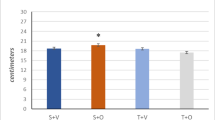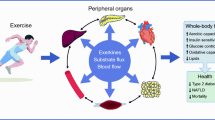Abstract
Menopausal women are at high risk of developing heart disease. However, physical exercise practice can reverse this scenario. We evaluated the biochemical, morphological, and physiological effects of moderate aerobic physical exercise on the pancreas of knockout mice for LDL receptor with estrogen deprivation by ovariectomy. Animals were divided into six groups (n = 5): sedentary non-ovariectomized control; sedentary ovariectomized control; trained ovariectomized control; sedentary non-ovariectomized LDL-R knockout; sedentary ovariectomized LDL-R knockout; and trained ovariectomized LDL-R knockout. Physical exercise practice promoted improvement in biometric and biochemical parameters analyzed, with reduction of visceral adipose tissue and VLDL, triglycerides, total cholesterol, and blood glucose levels. In addition, physical exercise practice altered the morphology of pancreatic islets and improved their response to the effects of menopause. Thus, physical exercise practice was fundamental to minimize the effects of dyslipidemia associated with ovariectomy in the pancreatic tissue of LDL-R knockout animals, contributing to reduce the risk of developing cardiac diseases in the menopause period.



Similar content being viewed by others
References
Marquezine GF, Mancini MC (2006) Diabetes mellitus no idoso. Rev Bras Med 63(12):169–176
Janssen I, Katzmarzyk PT, Ross R (2002) Body mass index, waist circumference, and health risk: evidence in support of current National Institutes of Health guidelines. Arch Intern Med 162(18):2074–2079
De Koning L, Merchant AT, Pogue J, Anand SS (2007) Waist circumference and waist-to-hip ratio as predictors of cardiovascular events: meta-regression analysis of prospective studies. Eur Heart J 28(7):850–856
Stevenson J, Crook D, Godsland IF (1993) Influence of age and menopause on serum lipids and lipoproteins in healthy women. Atherosclerosis 98:83–90
Austin MA, Breslow JL, Hennekens CG, Buring JE, Willett WC, Krauss RM (1998) Low-density lipoprotein subclass patterns and risk of myocardial infarction. J Am Med Assoc 260:917–1921
Papaléo NM, Carvalho Filho ET, Salles RFN (2006) Fisiologia do Envelhecimento. In: Papaléo NM, Carvalho Filho ET (eds) Geriatria: Fundamentos, clínica e terapêutica 2ª ed. São Paulo: Atheneu. 2005, pp 43–62
Savage DB, Petersen KF, Shulman GI (2007) Disordered lipid metabolism and the pathogenesis of insulin resistance. Physiol Rev 87(2):507–520
Wu YJ, Fang ZH, Zheng SG, Wu YB, Wang Z, Lu MA (2013) Effect of danzhi jiangtang capsule combined exercise on the protein expression of NADPH oxidase phosphox in pancreatic tissues of diabetic rats. Eur PMC 33(5):641–645
Jiménez-Maldonado A, Alvarez-Buylla ER, Montero S, Melnikov V, Castro-Rodríguez E, Gamboa-Domínguez A, Rodrígues-Hernández A, Lemus M, Murquía JM (2014) Chronic exercise increases plasma brain-derived neurotrophic factor levels, pancreatic islet size, and insulin tolerance in a TrkB-dependent manner. PLoS One 9(12):e115177
Amaral F, Lima NE, Ornelas E, Simardi L, Fonseca FLA, Maifrino LBM (2015) Effect of different exercise intensities on the pancreas of animals with metabolic syndrome. Diabetes Metab Syndr Obes Targets Ther 8:115–120
Machado UF (1998) Transportadores de glicose. Arq Bras Endocrinol Metab 42(6):413–421
Slentz CA, Tanner CJ, Bateman LA, Durheim MT, Huffman KM, Houmard JA, Kraus WE (2009) Effects of exercise training intensity on pancreatic β-cell function. Diabetes Care 32(10):1807–1811
Hughes VA, Fiatarone MA, Fielding RA, Kahn BB, Ferrara CM, Shepherd P, Fisher EC, Wolfe RR, Elahi D, Evans WJ (1993) Exercise increases muscle GLUT-4 levels and insulin action in subjects with impaired glucose tolerance. Am J Physiol Endocrinol Metab 264(6):855–862
Solomon TP, Malin SK, Karstoft K, Kashyap SR, Haus JM, Kirwan JP (2013) Pancreatic β-cell function is a stronger predictor of changes in glycemic control after an aerobic exercise intervention than insulin sensitivity. J Clin Endocrinol Metab 98(10):4176–4186
Malin SK, Kirwan JP (2012) Fasting hyperglycaemia blunts the reversal of impaired glucose tolerance after exercise training in obese older adults. Diabetes Obes Metab 14(9):835–841
De Oliveira F, Maifrino LB, De Jesus GP, Carvalho JG, Marchon C, Ribeiro DA (2013) The role of cyclooxygenase-2 on endurance exercise training in female LDL-receptor knockout ovariectomized mice. An Acad Bras Cienc 85(3):1157–1164
Marchon C, Ornelas EM, Viegas KAS, Lacchini S, Souza RR, Fonseca FLA, Maifrino LBM (2015) Effects of moderate exercise on the biochemical, physiological, morphological and functional parameters of the aorta in the presence of estrogen deprivation and dyslipidemia: an experimental model. Cell Physiol Biochem 35:397–405
Braggion GF, Ornelas E, Cury JCS, Lima NEA, Aquino RC, Fonseca LAF, Maifrino LBM (2016) Morphological and biochemical effects on the skeletal muscle of ovariectomized old female rats submitted to the intake of diets with vegetable or animal protein and resistance training. Oxid Med Cell Longev 2016:1–10
Angelis K, Santos MSB, Irigoyen MC (2004) Sistema nervoso autônomo e doença cardiovascular. Revista da Sociedade de Cardiologia do Rio. Grande do Sul 13(3):1–7
Stevens A (1982) The haematoxylins. In: Bancroft JD, Stevens A (eds) Theory and practice of histological techniques. 7th edn. Churchill Livingstone, New York, pp 109–144
Mandarim-de-Lacerda CA (2003) Stereological tools in biomedical research. An Acad Bras Ciênc 75(4):469–486
Graff-Iversen S, Thelle DS, Hammar N (2008) Serum lipids, blood pressure and body weight around the age of the menopause. Eur J Cardiovasc Prev Rehabil 15(1):83–88
Faria TS, Correia-Junior AL, dos Anjos TL, Aguila MB, Mandarim-de-Lacerda CA (2013) Adverse association between obesity and menopause in mice treated with bezafibrate, a pan peroxisome proliferator–activated receptor agonist. Menopause 20(12):1264–1274
Jouyandeh Z, Nayebzadeh F, Qorbani M, Asadi M (2013) Metabolic syndrome and menopause. J Diabetes Metab Disord 12(1):1–4
Meirelles RM (2014) Menopausa e síndrome metabólica. Arq Bras Endocrinol Metab 58(2):91–96
Saraceni C, Broderick TL (2007) Cardiac and metabolic consequences of aerobic exercise training in experimental diabetes. Curr Diabetes Rev 3:75–84
Golbidi S, Badran M, Laher I (2012) Antioxidant and anti-inflammatory effects of exercise in diabetic patients. Exp Diabetes Res 2012:1–16
Afonso M, Souza CA, Zagatto AM, Luciano E (2003) Respostas metabólicas agudas ao exercício físico moderado em ratos wistar. Motriz 9(2):87–92
Randle PJ, Garland PB, Hales CN, Newsholme EA (1963) The glucose fatty-acid cycle. Its role in insulin sensitivity and the metabolic disturbances of diabetes mellitus. Lancet I 13:785–789
Bonadonna RC, Groop LC, Simonson DC, Defronzo RA (1994) Free fatty acid and glucose metabolism in human aging: evidence for operation of the Randle cycle. Am J Physiol Endocrinol Metab 266(3):501–509
Haber EP, Curi R, Carvalho CR, Carpinelli AR (2001) Secreção da insulina: efeito autócrino da insulina e modulação por ácidos graxos. Arq Bras Endocrinol Metab 45(3):219–227
Hue L, Taegtmeyer H (2009) The Randle cycle revisited a new head for an old hat. Am J Physiol Endocrinol Metab 297(3):578–591
Silveira LR, Pinheiro CHDJ., Zoppi CC, Hirabara SM, Vitzel KF, Bassit RA, Carneiro EM (2011) Regulação do metabolismo de glicose e ácido graxo no músculo esquelético durante exercício físico. Arq Bras Endocrinol Metab 55(5):303–313
Cheik NC, Guerra RLF, Viana FP, Rossi EA, Carlos IZ, Vendramini R, Dâmaso AR (2006) Efeito de diferentes frequências de exercício físico na prevenção da dislipidemia e da obesidade em ratos normo e hipercolesterolêmicos. Rev Bras Educ Fís Esport 20(2):121–129
Huang CJ, Lin CY, Haataja L, Gurlo T, Butler AE, Rizza RA, Butler PC (2007) High expression rates of human islet amyloid polypeptide induce endoplasmic reticulum stress-mediated β-cell apoptosis, a characteristic of humans with type 2 but not type 1 diabetes. Diabetes 56(8):2016–2027
Silva M, Lima WGD, Silva ME, Pedrosa ML (2011) Effect of streptozotocin on the glycemic and lipid profiles and oxidative stress in hamsters. Arq Bras Endocrinol Metab 55(1):46–53
Hayek A, Woodside W (1979) Correlation and function in isolated islets of the Zucher rat. Diabetes 28(6):565–569
Poitout V, Robertson RP (2002) Minireview: secondary β- cell failure in type 2 diabetes a convergence of glucotoxicity and lipotoxicity. Endocrinology 143(2):339–342
Kim J, Yoon K (2011) Glucolipotoxicity in pancreatic β-cells”. Diabetes Metab J 35(5):444–450
Leal AMO, Voltarelli JC (2010) Perspectives of stem cell therapy in type 2 diabetes mellitus. Rev Bras Hematol Hemoter 32(4):329–334
Beaudry JL, Riddell MC (2012) Effects of glucocorticoids and exercise on pancreatic β-cell function and diabetes development. Diabetes Metab Res Rev 28(7):560–573
Iwase M, Uchizono Y, Tashiro K, Goto D, Iida M (2002) Islet hyperperfusion during prediabetic phase in OLETF rats, a model of type 2 diabetes. Diabetes 51(8):2530–2535
Lima CAA, Moreira RM (2010) A ação dos hormônios GH, catecolaminas, insulina, glucagon e cortisol nos níveis de glicose no corpo em exercício. E F Deport 15(151):1
Canali ES, Kruel LFM (2001) Respostas hormonais ao exercício. Rev Paul Educ Fís 15(2):141–153
Fernández-Pastor VJ, Alvero JR, Pérez F, Ruiz M, Fernández-Pastor JM, Diego AM (1992) Niveles de glucosa, glucagòn y hormona del crecimento plasmáticos en sujetos sedentarios y entrenados en respuesta a ejercicio máximo. Arch Med Deport 9(36):355–360
Author information
Authors and Affiliations
Corresponding author
Ethics declarations
Conflict of interest
The authors declare that they have no conflicts of interest.
Rights and permissions
About this article
Cite this article
Veloso, A.G.B., Lima, N.E.A., de Marco Ornelas, E. et al. Effects of moderate exercise on biochemical, morphological, and physiological parameters of the pancreas of female mice with estrogen deprivation and dyslipidemia. Med Mol Morphol 51, 118–127 (2018). https://doi.org/10.1007/s00795-018-0179-x
Received:
Accepted:
Published:
Issue Date:
DOI: https://doi.org/10.1007/s00795-018-0179-x




